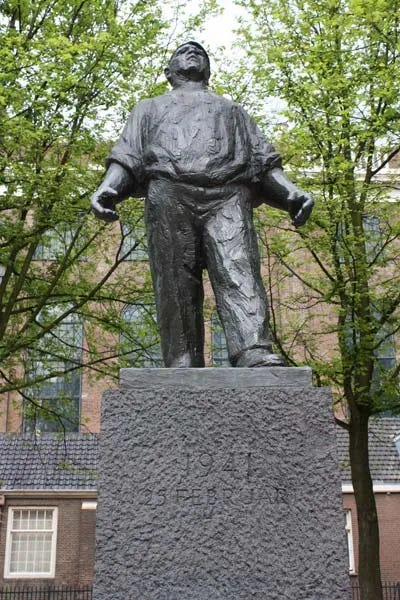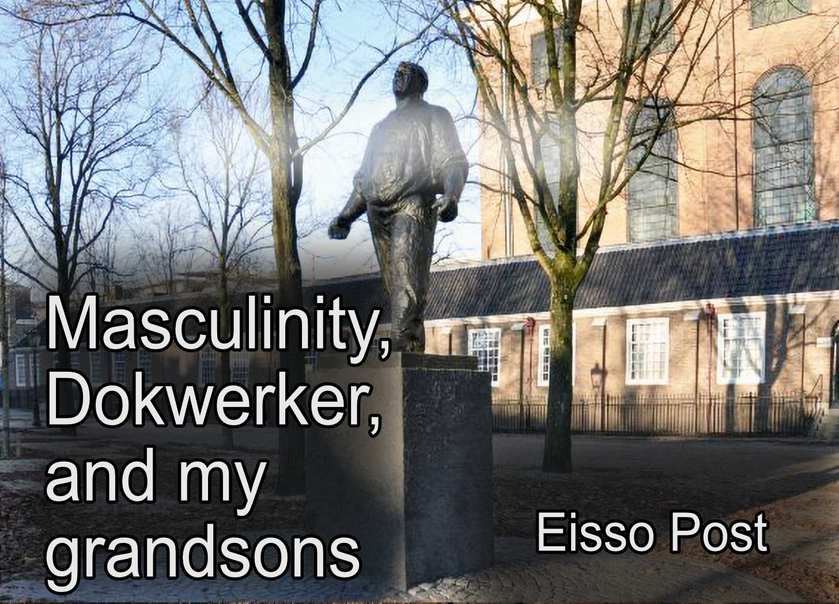This is a guest post from Eisso Post. You may remember the excellent writing he shared in November titled “Let Us Now Praise Awkward Men.“ I am betting you will like this one too. I know I do. Thank you Eisso.
_______________________________________
Masculinity, the Dokwerker and my grandsons
In Amsterdam, there’s a famous statue on the Jonas Daniël Meijerplein: ‘de Dokwerker’, theDockworker. It’s a tribute to the brave strikers on februar 25 and 26 in 1941 against the prosecution of Jews by the nazi occupiers.

It depicts an impressive, very masculine, working-class man. The kind of proletarian man that was admired by the left in those days, and Amsterdam was a very classical left-wing city. It is also the kind of proletarian man the ‘revolutionary left’ got disappointed in when it turned out that, with the Keynesian welfare state and massive production of consumer goods, most workers were quite happy with a 40 hours working week, a few weeks holiday (the ‘bouwvak’), social security, healthcare,
education, a tv and central heating. The less fortunate workers in the least attractive jobs, even those within the Communist Party, largely fought to also get those things.
Of course that’s no way to make a revolution. So the revolutionaries adopted new theories. These, starting with the Frankfurter Schule, with a handful of steps inbetween, ended up with about the worst of all ideological worlds: postmodern intersectional identity politics, with the ‘cishet white man’ on top of the oppression olympics.
To remain a bit cautious, officially those men as such aren’t hated. But to be accepted, they must swear off their ‘toxic masculinity’. That includes such characteristics as strength, being impressive and dominant when needed, protectiveness, ignoring your fear when it is best ignored. All the masculine traits the Dokwerker has. The admired working class man became the bogeyman of the new left.
When I was a teenager and, as so many teenagers, found it hard to find my way in the world, the idea of masculine traits harming men became fashionable among left-wing people: being more practical than emotional, acting rough, not being allowed to cry, the whole shenanigan. As I was less masculine than average anyway, I decided to adopt this ideology: cultivate my softer, more gentle sides as much as possible and let my tougher and more dominant side wither away. (Only with my
heterosexual lust, this didn’t work out: I could be told all the time my desire to have sex with girls was just to boast my masculine image and/or prove I’m not gay, I never managed to feel it that way and the desire only got stronger.) As to all kinds of industrial and manual labour: not only was it traditionally masculine, it was also bad for the environment. Engines, synthetic products like glues, noise, you know what I mean. So I shunned that world, though without condemning the people in it.
In other places, I described how this attitude got me nowhere in my life. But this more or less happy ending is quite surprising:
My twin grandsons are two years and a few months old now. Since two years, I almost everyday spend a few hours with them. And since about a year, we walk together around the neighborhood. For boys that age, you don’t need an amusement park: the whole world is one. Stairs, statues, dogs, cats, even stones, berries and chestnuts are just as many miracles.

But among the greatest attractions are men at work. Men renovating houses amidst scaffolding tubes; men digging holes in the street with noisy machines; men on big trucks emptying garbage containers or gathering heaps of leaves in the park. White and orange lights, sometimes flickering, during the dark season. And all those supposedly toxic men are surprisingly friendly towards the toddlers. When I make jokes about their ‘fans’ being there again, they react just as cheerful. When
they ask us to keep away somewhere, mostly with good reasons, they’re never harsh or impatient. And once an older man even lifted them up in his truck. Heaven!
(Are those really boys’ things or do all little children enjoy it just as much? Well – my sister has an organic food shop. Not exactly the place visited by parents raising their children in a traditional way. And she says: ‘Of course there is a difference! The little boys always want to look when I’m handling the bread cutting machine. The girls aren’t interested.’ So, I’d say, at least on average there will be a difference.)
There were even moments when I myself longed to be a man like that. Dressed in a fluorescent green and/or orange suit, carrying stones in my arms or with a small wagon, being dirty all day till I can shower at night, telling jokes to my colleagues. (Yes, I know, it’s romanticising a life like that.)
But not only working men are interesting. The boys have a great fascination for basketball players in the park. They’re all tall, athletic boys, and as diverse as you could wish. Brown, white, Dutch, Arabs, Turkish, Eastern European and from the English speaking world. And they’re so sweet with the boys! They don’t mind at all when the boys disturb them but start playing with them, rolling a ball to and fro. Sometimes they lift them up so the boys can ‘score a point’. Those moments are highlights of the day.
Mind you, my conclusion is not that all men should by now adopt traditional male characteristics and be like the Dokwerker. Nobody should be anything else than they please to be. Let them be machos or softies or extravagant gays or cowboys or hippies. And I myself will never be like the Dokwerker. I’m not that strong and impressive. And I will always like poetry, acoustic melodious music, walking in
beautiful landscapes. I like caring for people and being around children – which is obvious, or I wouldn’t spend so much time with those two marvellous little men.
But thinking you will be happier by discarding your rougher, tougher, more dominant, maybe dirtier, ‘traditional masculine’ traits is not the way either. I myself wish now I had cultivated them more since my teen years, when I was still very malleable.
____________________________________
Eisso Post (Edam, Netherlands, 1956) writes short stories and coached beginning authors of all convictions. He also contributed to Janice Fiamengo’s ‘Sons of feminism’. Nowadays he’s mainly the grandfather of two splendid boys.



















